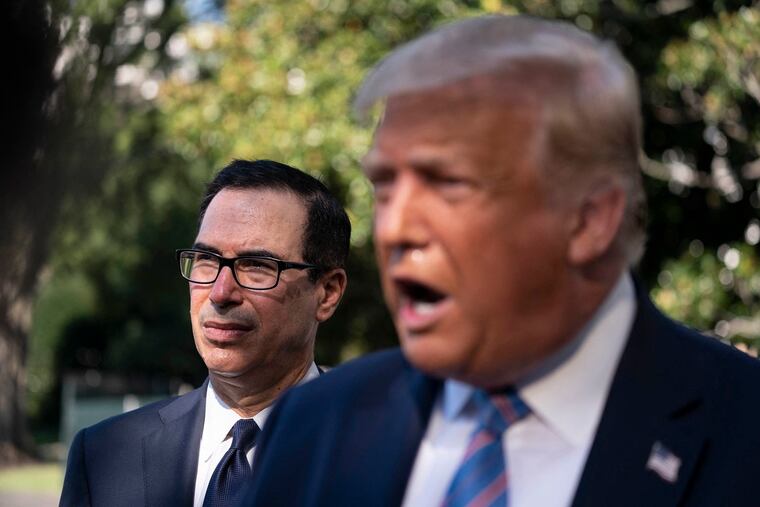SBA loan forgiveness prompts relief, but also confusion about timeline and rules
But business owners may want to wait and see before applying for loan forgiveness by the Oct. 31 deadline.

Philadelphia’s small-business owners are relieved to hear that their Small Business Administrations loans of up to $50,000 could be wiped clean.
But no one is rushing to lenders yet to apply for forgiveness.
First, sweeter terms may be on the horizon.
“The rumor was loans of up to $150,000 would be forgiven,” said Maura Shenker, director of the Small Business Development Center at Temple University, which helps business owners through the borrowing and repaying process.
Second, applying for forgiveness has its own set of complex rules. Paycheck Protection Program loans are made by lenders but guaranteed by the SBA. They are low interest (1% annually) and fully forgivable if businesses meet certain conditions.
Banks, online lenders and other financial institutions that gave out the SBA money "will forgive the loans only if everything goes right. If you spent all your money on payroll, you’re golden,” she said.
» READ MORE: SBA offers total forgiveness for loans of $50,000 or less, helping PPP small-business borrowers
If business owners spent the loan differently, the paperwork will likely be heavy-duty.
“Each bank required base SBA rules plus their own restrictions on top,” Shenker said. “The risk is on the bank, even though that’s not what the government is saying. The SBA has the ultimate choice to forgive or not forgive."
Wait and see?
In March, Congress passed the CARES Act, which provided more than $2 trillion in emergency assistance. Among the programs was the Paycheck Protection Program of forgiveable loans, administered by the SBA.
The SBA posted forgiveness instructions on its website, www.SBA.gov, which outline the forms and documents required.
In the form, borrowers must certify that funds were used for eligible expenses and were spent at least 60% on payroll, and other limits, said Wilfrid Baptiste, principal with Financial Blind Spot who is advising clients on PPP.
But “we’re telling everyone to wait and not apply yet. Anyone who doesn’t have their paperwork together, the SBA may not accept it. The bank will then demand repayment from business owners,” Shenker said.
“We want to know exactly what the rules are, and give people the best chance possible.”
Bank statements and canceled checks may suffice.
From a practical perspective, “the business cannot use the money for inventory, supplies, or other operating expenses,” said David Zalles, CPA in Blue Bell.
Two-thirds of the loans granted to businesses in Philadelphia were for $50,000 or less. However, that only accounts for 12% of the total amount lent since loans were for up to $10 million, according to SBA data.
Two business owners in Philadelphia who received PPP loans under $50,000 were Rudiger “Rudy” Ellis, co-founder of Switchboard, a start-up in Center City, and Tiffanie Stanard, founder of Stimulus, created in 2017 as a search engine for supply-chain vendors. They also were the recipients of Google cash awards of $50,000 announced earlier this month.
“We got a small PPP loan of $43,000 through the Enterprise Center,” Stanard said. Her company is in the process of raising money with Gabriel Investments, apartment mogul David Adelman, and some angel investors.
If the SBA rules remain the same, "forgiveness should be pretty quick. These small loans of under $50,000 really should be automatically forgiven,” said Stanard. A graduate of Little Flower High School, Stanard, 34, is on the board of Philly Startup Leaders and the Philadelphia Alliance for Capital and Technologies.
Rudy Ellis, co-founder of Switchboard.Live, a streaming platform, also applied for a PPP loan of less than $50,000. Switchboard customers use software to stream content to different channels such as Facebook and Youtube. A native of Philadelphia, he graduated from George Washington High School and then Howard University, before creating a career in Silicon Valley and at Electronic Arts gaming company.
He, too, used the PPP loan as part of a larger effort to keep growth on track. Switchboard is targeting revenues for 2020 of $500,000 and wants to double that by 2021.
“We did a PPP loan of $43,000 through Silicon Valley Bank,” Ellis said. Ben Franklin Partners also invested in Switchboard, and to date the company has raised $2.1 million in investor money.
“The forgiveness limit really should be raised, otherwise that just creates more work for the SBA,” he said.
Webinars on loan forgiveness
On Monday, Oct. 19, the Greater Philadelphia Chamber of Commerce will host a virtual webinar on PPP loan forgiveness with lenders and borrowers to better understand how their business can qualify.
To register for the webinar, which will start at 11 a.m., visit the chamber’s website at https://apps.chamberphl.com/events.
As part of the Women’s Small Business Virtual Workshop Series, SCORE Bucks County is collaborating with the Small Business Administration and the TriCounty and the Chester and Delaware County chapters of SCORE to host a webinar, “Recovery Continues – Updates on SBA Programs and Services – Economic Injury” which will be offered on Dec. 16.
GAO’s report
In a report dated Oct. 1, the Government Accountability Office issued a scathing review on the SBA’s loan program. On Sept. 10, 2020, Department of Justice officials announced that they had charged 57 people with PPP-related fraud. These cases involve alleged attempts to steal more than $175 million from PPP with actual losses to the federal government of more than $70 million, according to testimony by William B. Shear, director of Financial Markets and Community Investment at the GAO.
There are two levels of forgiveness: First, the bank or lender must accept the forgiveness application, then the SBA either accepts or denies. But it is still unclear to what extent banks are responsible for verifying information or relying on borrowers' descriptions of their finances.